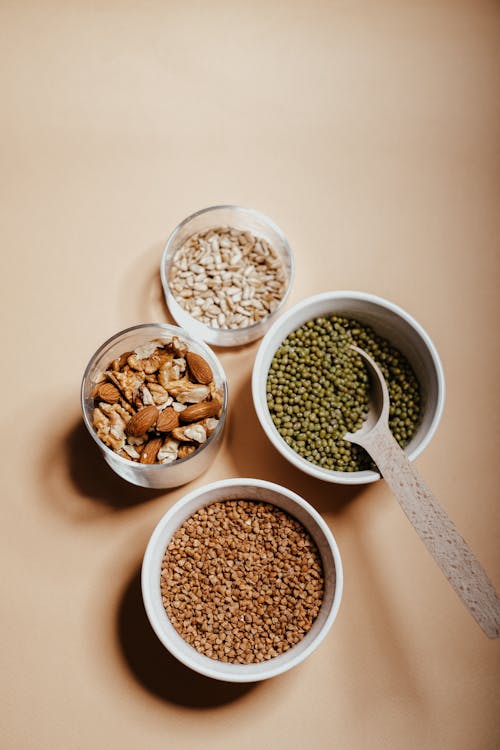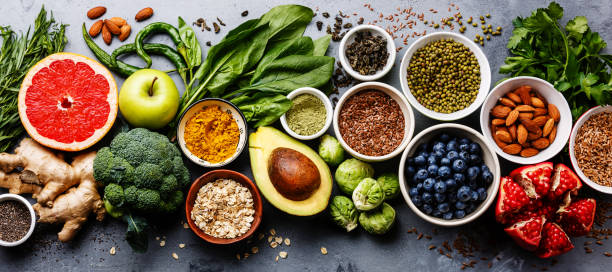Superfoods are often heralded as the ultimate solution to improving health due to their exceptional nutrient density. While there is no official scientific definition of a superfood, the term generally refers to foods that are particularly high in vitamins, minerals, antioxidants, and other nutrients that contribute to overall well-being. Incorporating superfoods like kale, quinoa, chia seeds, and acai berries into a balanced diet can provide a wide range of health benefits, helping to support everything from heart health to weight management. This article explores the nutritional benefits of these popular superfoods and how they can complement a healthy eating plan.

Kale: The Green Powerhouse
Kale has become one of the most widely recognized superfoods due to its impressive nutrient profile. This dark leafy green is a rich source of vitamins A, C, and K, as well as minerals like calcium, magnesium, and potassium. Kale is also packed with fiber, which supports digestive health and helps regulate blood sugar levels.
- Nutritional Benefits:
- High in antioxidants: Kale is loaded with antioxidants such as quercetin and kaempferol, which help combat oxidative stress and reduce inflammation in the body.
- Heart health: The fiber and antioxidants in kale have been shown to lower cholesterol levels, which can improve cardiovascular health.
- Cancer prevention: Kale contains compounds known as glucosinolates, which are believed to have protective effects against certain types of cancer by promoting the detoxification of harmful substances.
Incorporating kale into your diet can be as easy as adding it to salads, smoothies, or as a sautéed side dish.
Quinoa: A Complete Protein Source
Quinoa is often called a “complete protein” because it contains all nine essential amino acids, making it an excellent plant-based protein source. It’s also a great alternative to refined grains due to its high fiber content. Quinoa is rich in vitamins and minerals, including magnesium, folate, iron, and zinc, and is naturally gluten-free.
- Nutritional Benefits:
- Protein and fiber: Quinoa’s combination of protein and fiber helps with muscle repair, digestive health, and satiety, making it a valuable component in a balanced diet.
- Blood sugar control: The fiber in quinoa helps slow the digestion of carbohydrates, preventing rapid spikes in blood sugar and supporting long-term blood glucose regulation.
- Rich in antioxidants: Quinoa contains a variety of antioxidants, including flavonoids like quercetin and kaempferol, which have anti-inflammatory and immune-boosting properties.
As a versatile ingredient, quinoa can replace rice or pasta in many dishes, adding a nutritious twist to your meals.
Chia Seeds: Tiny But Mighty
Chia seeds may be small, but they are packed with nutrients. These tiny seeds are rich in omega-3 fatty acids, fiber, and antioxidants, making them a great addition to any diet. They also provide a substantial amount of protein for their size and are one of the best plant-based sources of calcium.
- Nutritional Benefits:
- Omega-3 fatty acids: Chia seeds are one of the richest plant sources of omega-3s, which are essential for brain health, heart health, and reducing inflammation.
- Digestive health: With a high fiber content, chia seeds support healthy digestion and can help prevent constipation.
- Hydration: Chia seeds absorb a significant amount of liquid and form a gel-like substance when soaked. This helps with hydration and can aid in feeling full for longer periods.
Chia seeds are easy to add to a variety of dishes, from smoothies and yogurt to baked goods and salads. You can even make chia pudding by soaking them in milk or a milk alternative overnight.

Acai Berries: Antioxidant-Rich and Anti-Inflammatory
Acai berries, native to the Amazon rainforest, have gained global popularity due to their high antioxidant content. These small, dark purple fruits are packed with anthocyanins, which give them their deep color and offer powerful anti-inflammatory benefits. Acai berries are also a good source of healthy fats, fiber, and several essential vitamins and minerals, including vitamin C and calcium.
- Nutritional Benefits:
- Antioxidant power: The high levels of anthocyanins and other antioxidants found in acai berries help fight free radicals, which can damage cells and lead to chronic diseases like heart disease and cancer.
- Anti-inflammatory: The compounds in acai have been shown to reduce inflammation, which can help prevent or manage conditions like arthritis or heart disease.
- Supports heart health: Acai berries contain heart-healthy omega-9 and omega-6 fatty acids, which can help reduce cholesterol levels and improve circulation.
Acai berries are often found in frozen form, and their pulp can be blended into smoothies or used as a base for acai bowls, often topped with granola, coconut, and fresh fruit.

How Superfoods Contribute to a Balanced Diet
While superfoods are nutrient-dense and provide a wealth of health benefits, they should be part of a well-rounded, balanced diet that includes a variety of whole foods. Incorporating superfoods like kale, quinoa, chia seeds, and acai berries into meals will enhance nutrient intake, but they should not replace other important food groups like lean proteins, healthy fats, fruits, and vegetables.
- Combining Superfoods: You can easily combine these superfoods into meals to create balanced dishes. For example, a quinoa salad with kale, chia seeds, and a handful of acai berries can be a nutrient-packed lunch or dinner.
- Variety Is Key: While these superfoods are fantastic additions to your diet, it’s important to include other whole foods to ensure you’re getting a broad spectrum of vitamins, minerals, and nutrients. Don’t rely on just one food to meet all your nutritional needs.
Conclusion
Superfoods like kale, quinoa, chia seeds, and acai berries are more than just trendy foods—they are incredibly nutrient-rich and offer a wide range of health benefits. From supporting heart health and digestion to providing essential nutrients, these foods can significantly enhance the quality of your diet. By incorporating them into a well-rounded, balanced meal plan, you can harness their power to improve overall health and well-being. Remember, the key to a healthy diet is variety and moderation, so enjoy these superfoods as part of a diverse and nourishing eating plan.











